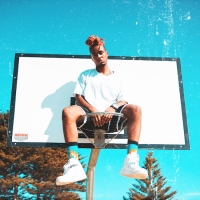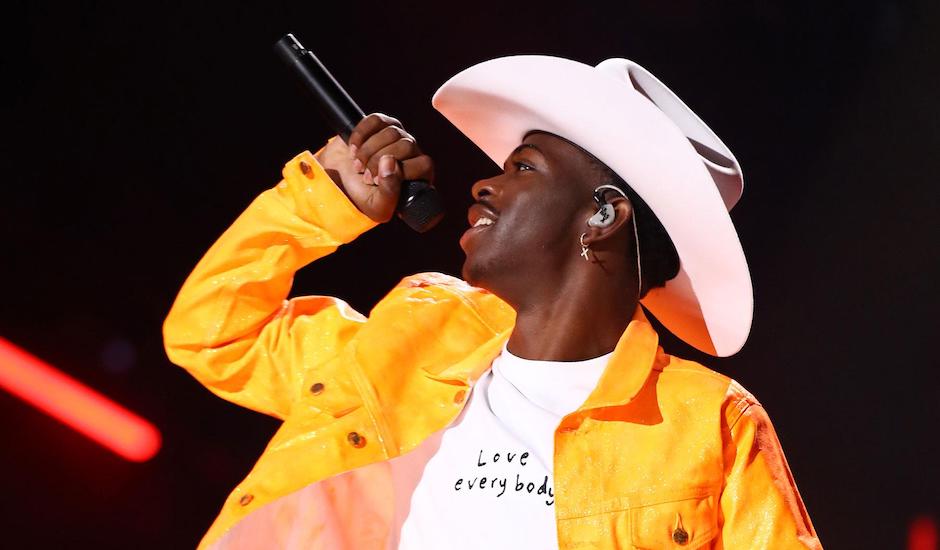 Meet Jaycee, the rapper dropping a new song and music video every week for six monthsKicking off next week, the project promises 26 new songs - and videos to match - until January 2020.
Meet Jaycee, the rapper dropping a new song and music video every week for six monthsKicking off next week, the project promises 26 new songs - and videos to match - until January 2020.

Like it or not, Lil Nas X is here to stay – and it's a good thing
Following the success of Old Town Road, it's become clear that the rapper is defining a new edge to country music.
Lil Nas X is a success story in a music industry built against him. Born Montero Lamar Hill in Atlanta, the queer, cross-genre rapper and Old Town Road runaway star is a success story of the internet and meme culture, proving that no matter how the much the charts are built around label manipulation and payola (a record label or other exterior force paying for radio, playlist and/or website placement for a certain artist), music success isn't limited to a one-fit model, and that's a good thing.
The success of Old Town Road is hazy and often shrouded with controversy or distaste, but it's one of the most interesting examples of chart success in recent memory. The rap-influenced country song - or country-influenced rap song, depending on how you look at it - was born after Nas brought a $30 beat he found on the YouTube account of Dutch producer YoungKio, which interpolated an ambient Nine Inch Nails sample and built it into a country-twanged trap production that Nas X then wrote over, often having to search for cowboy-related sayings and slang, as his self-described experience with 'cowboy culture' extends only as far as having a pair of Wrangler boots growing up.
Once formulated into a song that Nas believed was catchy and caption-worthy ("I was like, ‘I gotta make it short, I gotta make it catchy, I gotta have quotable lines that people want to use as captions.'," he told Rolling Stone), he teased it on his Twitter, before posting the full track two weeks later and promoting it through cowboy memes and the 'yeehaw agenda' - the rise of internet-based cowboy culture that's aided in the mainstream acclaim of once-niche acts including Kacey Musgraves - to gain social traction that would eventually, turn into sales. Eventually, Michael Pelchat - who runs a popular account (@nicemichael) on rising social media platform TikTok - came across the track on Soundcloud, and made the track go viral on the platform, ushering it into a level of mainstream success that eventually, in March this year, found Old Town Road's two-minute punch of accessible country-rap find itself on the Billboard country chart.
Here, is where many associate Old Town Road's success to truly begin. After hovering on the country charts, Billboard pulled the song from its country chart due to 'misclassification', stirring headlines and think-pieces about the underlying racism of country music and its surrounding, comparatively traditional industry that ultimately led to Old Town Road's removal. Many believe that this action - and the surrounding, larger controversy of the move - only encouraged people to stream the single more (perhaps out of spite, some suggest), eventually turning the single into a streaming machine that gave Nas a multi-million dollar deal with Columbia (a division of mega-label Sony Music Entertainment) and resultedly, a Billy Ray Cyrus-including remix that would take the track to #1.
With Billy Ray Cyrus in tow, Old Town Road has turned into one of this decade's strongest singles. In the US, it's held the pole position of the Billboard charts for 12 weeks and currently, is growing each week, responsible for nine of the eleven largest streaming weeks in history - including the entire top three. Only eleven songs in history have charted the Billboard Hot 100 for longer - Despacito, Uptown Funk!, I Gotta Feeling and Whitney's I Will Always Love You some of the music-defining singles ahead of him - and it's proving itself unstoppable, holding back numerous sure-fire #1 singles from actually hitting number one - Post Malone's Wow, Taylor Swift's comeback ME! and follow-up You Need To Calm Down, Shawn Mendes' If I Can't Have You and Ed Sheeran's chart-destined mega-collab with Justin Bieber, I Don't Care, rounding off the list. In Australia, it's held number one on the ARIA Charts for nine weeks, becoming one of the 20 longest-standing number ones of all time.
Old Town Road's grand success has come with head shakes and confusion. Despite its hyper-accessibility combining two of the strongest worldwide genres together and its short duration perfect for streaming's repeatability, you'll often find confusion as to how the song has become so popular, and articles and social media posts celebrating his success are often flooded with social media stans (super fans) knocking him down in favour of the pop stars they fawn over. He's been subject to smear campaigns (for example, in an attempt to dethrone his song from number one in anticipation of Nicki Minaj's new single MEGATRON, Minaj fans have attempted to circulate old, problematic tweets from his previous Twitter account with the #LilNasXIsOverParty hashtag, and others have compiled information on Nas' backstory and personal information to ridicule him) and with the release of his new EP 7, he's been dragged by music press and reviewers. Yet, despite everything, Old Town Road isn't letting up - and it's a good thing.
On a larger scale, Old Town Road represents a hope story in an industry plagued by big figures, big cheques, and big labels. The bulk of Old Town Road's visible success has come post-signing to Columbia/Sony, however, much of the groundwork was laid with Lil Nas X in the driver's seat, unaccompanied by even a manager (he credits his Dad as helping him work the industry in his earlier days) as he navigated early charts and record label offers once Old Town Road started to blossom. At the end of the day, it's a story of how a young, black teenager triumphant against an industry - and a genre - completely built against him, flipping the traditionalist mark of country music and causing a ruckus in the process. It's a story of how independence can win, and a message that even if you can't muster the attention of major labels, you can still strive - and then they'll start paying attention. It's a song untouched by A&R teams and long, window-paralleled major label office desks, and it's a reminder that sometimes, unpredictable hits can be really exciting to watch.
And, as aforementioned, Old Town Road is a lesson at how genres don't have to necessarily be restricted to one, distinct sound and style. Country music is often associated with traditionalism and in a way, the white male. Across the past ten years, the number of number one songs on the Billboard country chart not made by a white male can be counted on two hands; even Kacey Musgraves, country-pop's golden girl, has had her rise marred by country enthusiasts as her music is too pop-rooted and hook-based. Lil Nas X isn't what your standard, 2000s country star looks like - he's spoken about his encounters with drug and gang-related violence growing up in Atlanta, and his social media is plagued with memes more than promo - but despite this, he's proving a defining name in the genre with just one hit, even if he's maybe not going to focus on country music in the future. "It hasn’t even been a full year of me making music yet," he says to Rolling Stone, addressing the sound of his then-forthcoming debut EP 7 which, on release, would see his hip-hop sound meet punk-rock blasts assisted by Blink 182's Travis Barker and western guitar twangs combing with a surprise guest verse by Cardi B on Rodeo.
It's interesting, considering that country music - like many genres - was defined by black musicians; the ones who like Lil Nas X, are being shut out of their own genre. As Vinyl Me Please notes, Ray Charles’ Modern Sounds in Country and Western Music Vol. I and II were some of country music's first, commercially-popular records and Elvis Presley - considered one of the most significant cultural icons in history - made much of his living interpolating or covering songs by black artists; he even said so himself: "A lot of people seem to think I started this business. But rock ‘n’ roll was here a long time before I came along. Nobody can sing that kind of music like coloured people. Let’s face it: I can’t sing like Fats Domino can. I know that." To dismiss Lil Nas X from country music is, in a way, denying those that invented it from flourishing off of it.

Furthermore, Old Town Road's domination strengths the argument that today, the music industry is powered by internet phenomenon. The rise of stan culture and its effects on the music industry is something explored previously, but it's now at a stage that can make or break careers - platforming niche musicians à la Slayyyter into success, while simultaneously hindering careers through smearing and attacks. Lil Nas X's success is a product of the former in a way, but more-so in a meme approach; whether it be Nas purposefully building the song into one heavily-repeatable and playful, or promoting its early beginnings through cowboy memes and the often-referred yeehaw agenda ("Twitter can make a lot of things happen if you get enough retweets," he mentions to Rolling Stone).
TikTok is a reputable and commonly-overlooked source of musical fame; Nas being only one of many younger musicians to break out on the platform, with others including Ava Max (whose song Sweet But Pyscho is proving dominative on the charts too) and Supa Dupa Humble, a rapper whose early rise was one of the first instances of TikTok's larger effects on the music industry. "TikTok empowers artists by being an avenue for visual output and creativity," told TikTok’s director of music content and artist relations Mary Rahmani to Time earlier this year. "We offer a platform that is creative, collaborative, global and unique." It's an open-ended platform largely free from DCMA takedowns and music right pay-outs, and as a result, challenges involving song snippets - which artists like Rae Sremmund have manipulated to find chart-toppers of their own (Black Beatles) - are becoming more common and more powerful.
It's something that the mega-platform are adapting too as well, growing alongside the artists TikTok often push into commercial culture through memes and challenges. In April, TikTok launched Spotlight in Japanese and Korean markets to discover and support independent and unsigned artists by promoting them in their featured songs playlist, giving TikTok users more opportunities to create content with the artists' music. When launched, TikTok Spotlight had some of the world's biggest labels and music companies signed on - Warner Japan, Universal Music, Sony Music, Spotify and user-uploading service Tunecore included, alongside members of BTS, EXO and Monsta X.
Lil Nas X's blossoming into one of the world's biggest artists - the 12th, according to Spotify - is one that comes with a lot of lessons for the music industry and the larger, music-consuming community and, if we want anyone to be the person who ushers these conversations into the public spotlight, we're glad it's someone who stans Rihanna and knows how to credit their fucking artists.
 Meet Jaycee, the rapper dropping a new song and music video every week for six monthsKicking off next week, the project promises 26 new songs - and videos to match - until January 2020.
Meet Jaycee, the rapper dropping a new song and music video every week for six monthsKicking off next week, the project promises 26 new songs - and videos to match - until January 2020.
 Premiere: Perth breakout Adrian Dzvuke returns with new single, SaturdayTeaming up with Perth rapper Mali Jo$e, Adrian Dzvuke's latest single continues to set him up as one of the city's most exciting.
Premiere: Perth breakout Adrian Dzvuke returns with new single, SaturdayTeaming up with Perth rapper Mali Jo$e, Adrian Dzvuke's latest single continues to set him up as one of the city's most exciting.